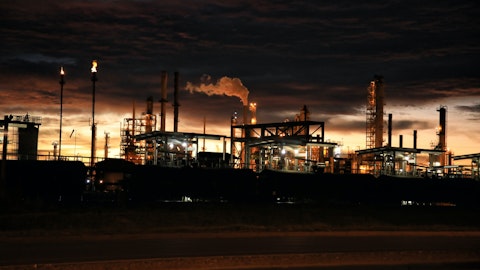2. Devon Energy Corporation (NYSE:DVN)
Dividend Yield as of December 2: 7.57%
Devon Energy Corporation (NYSE:DVN) engages in the exploration of hydrocarbons. The company reported a strong cash position in Q3 2022, generating $1.5 billion in free cash flow and $2.1 billion in operating cash flow. Moreover, its revenue of $5.43 billion showed a 56.5% growth from the same period last year.
Devon Energy Corporation (NYSE:DVN) is currently a part of Cramer’s Charitable Trust. He holds a positive view of the company because of its strong dividend policy and solid dividend yield. He also recommended the stock with respect to Morgan Stanley’s ‘Year of the Yield’ report, mentioning that DVN can generate solid cash for shareholders if oil prices remain above $75 per barrel.
Devon Energy Corporation (NYSE:DVN) has been making consistent dividend payments to shareholders for the past 29 years, coming through as one of the best dividend stocks on our list. The company pays a quarterly dividend of $1.35 per share and has a dividend yield of 7.57%, as of December 2.
Devon Energy Corporation (NYSE:DVN) was a part of 51 hedge fund portfolios in Q3 2022, according to Insider Monkey’s database. The stakes owned by these hedge funds have a total value of over $1.5 billion.
GoodHaven Capital Management mentioned Devon Energy Corporation (NYSE:DVN) in its Q2 2022 investor letter. Here is what the firm has to say:
“Our biggest dollar gainer within this period was Devon Energy Corporation (NYSE:DVN), a position which emanated from a takeover in early 2021 of our long time holding WPX Energy. We are sitting on a material (unrealized) gain from our cost and are now receiving material dividends thanks to Devon’s thoughtful fixed/variable dividend policy. Energy is now a hot sector for investors but we have had a material exposure for a long time. We remember a bit too well $40 oil, NEGATIVELY PRICED front-month oil contract, and what it’s like to own a company with leverage and negative free cash flow during such periods. Our desire to have our biggest portfolio exposures be high return, growing, reasonably predictable and moderately levered companies lead us to reduce our Devon exposure in the past. When the recent facts and circumstances for the industry changed and appeared supportive of healthy oil prices, we decided to maintain a sizable holding and more recently added to the position. At Devon’s Q1 dividend rate, which is mostly variable in nature, the shares now yield approximately 10% and our yield on our average cost is materially higher. In addition, we maintain additional energy exposure through our long-term (and successful) holding in Hess Midstream and less directly through TerraVest and Berkshire Hathaway’s energy investments.”





